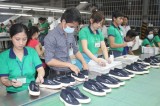Developing auxiliary industry to facilitate investors
In recent years, auxiliary industry of Binh Duong province has developed rapidly. The province fulfilled the planning, invested in industrial parks for this industry in order to facilitate investors.
To create competitive advantages
In the 2011-2015 period, industry production in Binh Duong province has made a large progress and contributed to provincial economic growth and restructure. The rapid growth of industrial production led to a big demand for raw materials. This was the foundation of the development of auxiliary industry.
Auxiliary industry started to grow rapidly in Binh Duong in 2005. Auxiliary industries serving textile, footwear, mechanical, electrical, wood processing industry in the province have increased in enterprise number, production value, sales..., contributing greatly to the processing industry.

Auxiliary production at KBK Vietnam Company (My Phuoc industrial park, Ben Cat town)
Currently, the province has formed manufacturing industries of raw materials serving textile (yarn production, weaving, dyeing ...), leather shoes ((tanning, producing shoe soles, uppers...), mechanics (manufacturing metal, machinery and parts of automobiles, motorcycles ...), electronics (manufacturing electronic components, conductivity wires, optical fiber...).
In recent years, the province has attracted many FDI projects in auxiliary industry. The development of auxiliary industry has promoted its positive effects in industrial production, helped to reduce trade deficits, increase good value, and competitive advantages of businesses. However, to finish a product, businesses in the province and across the country still have to import raw materials.
Binh Duong has 29 industrial parks, 8 industrial clusters, and more than 22,000 domestic and foreign enterprises. Therefore, the FDI attraction in auxiliary industry has a high potentiality and will be a big advantage of Binh Duong and neighboring regions in order to decrease the dependence on imported raw materials.
Turning towards autonomy in production
The Trans-Pacific Strategy Economic Partnership Agreement (TPP) reached an agreement and is expected to be signed early next year, which will offer for new opportunities to our country. However, TPP has specific regulations on origin of goods to ensure benefits and priority of its members.
Earlier, to seize opportunities from trade agreements, Binh Duong province adjusted the planning of industrial zones to facilitate auxiliary industries. According to Bui Minh Tri, Deputy Head of provincial Management Board of industrial parks, to facilitate investors, the province saved 300 hectares in Bau Bang industrial park for auxiliary industry development. The infrastructure construction is now completed, investors only need to register to launch their projects.
According to Nguyen Quang Vu, Director of Nam Binh Company, footwear industry still have to import raw materials. Once the province enhanced auxiliary industries, provincial businesses would be able to take advantage of this, helping businesses to be independent in their production and increase export value.
Binh Duong province is going to publicize raw material producing areas. This will create favorable conditions for enterprises to utilize advantages of TPP. This will also help the province to develop industrial production sustainably.
Reported by Phuong Le – Translated by Ngoc Huynh
 PM demands special mechanisms for Noth - South high-speed railway project
PM demands special mechanisms for Noth - South high-speed railway project
 Listening, solving problems, supporting enterprises to develop
Listening, solving problems, supporting enterprises to develop
 Bau Bang district Association of Women coordinates to introduce and connect OCOP
Bau Bang district Association of Women coordinates to introduce and connect OCOP
 Towards sustainable economy
Towards sustainable economy
 Provincial Trade Union supports VND53billion, 100 tons of goods for flood and storm-hit people
Provincial Trade Union supports VND53billion, 100 tons of goods for flood and storm-hit people
 Supporting enterprises in promoting automation
Supporting enterprises in promoting automation
 New motivation for Thuan An city to develop
New motivation for Thuan An city to develop
 Taking advantage of new opportunities in investment attraction
Taking advantage of new opportunities in investment attraction
 Training course on labor hygiene and safety opens to tens of enterprises
Training course on labor hygiene and safety opens to tens of enterprises
 The defense of trade in Binh Duong to assist enterprises downturning challenges
The defense of trade in Binh Duong to assist enterprises downturning challenges








